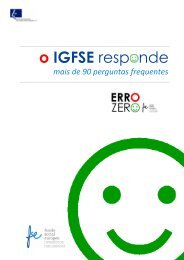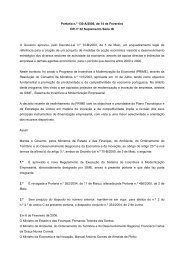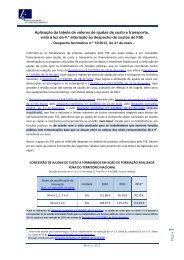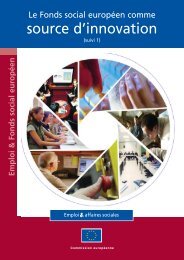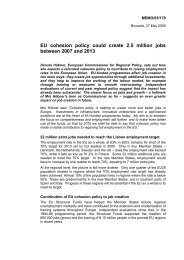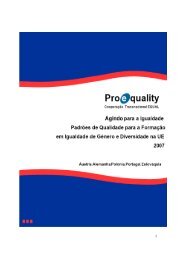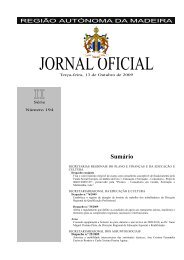Industrial Relations in Europe 2012 - European Commission - Europa
Industrial Relations in Europe 2012 - European Commission - Europa
Industrial Relations in Europe 2012 - European Commission - Europa
Create successful ePaper yourself
Turn your PDF publications into a flip-book with our unique Google optimized e-Paper software.
funds. The schemes were based on pension legislation enacted shortly before these agreements,<br />
which stipulated that workers should <strong>in</strong>vest up to 4% of their <strong>in</strong>come <strong>in</strong> private pension schemes.<br />
Trade unions and employers were at the time keen to take the opportunity to create company-level<br />
and <strong>in</strong>dustry-level schemes (Behrens (2001). Among the first to set up a scheme was the<br />
management and works council at the German carmaker Volkswagen AG. This was followed by the<br />
creation of a jo<strong>in</strong>t <strong>in</strong>dustry-level fund <strong>in</strong> the construction <strong>in</strong>dustry and shortly afterwards schemes<br />
based on agreements for the metalwork<strong>in</strong>g and chemicals sectors, thus ensur<strong>in</strong>g that labourmanagement<br />
sponsored private pension schemes were available for a large part of the German<br />
workforce. However, the two schemes <strong>in</strong> the metalwork<strong>in</strong>g and chemicals sectors go beyond this <strong>in</strong><br />
that they provide workers with options to convert part of their <strong>in</strong>come <strong>in</strong>to pension assets. The<br />
schemes also exempt <strong>in</strong>vestment from tax and social security contributions.<br />
Chemicals sector<br />
The chemicals sector fund offers a high level of flexibility <strong>in</strong> <strong>in</strong>vestment decisions and m<strong>in</strong>imises<br />
adm<strong>in</strong>istrative costs. Initially, the social partners had hoped to sign up about 300,000 workers out of<br />
the 590,000 who were covered by this collective agreement. Under the scheme, employees can<br />
convert up to 4% of their <strong>in</strong>come directly <strong>in</strong>to pension assets. These contributions are tax-exempt.<br />
Income <strong>in</strong>cludes pay, annual bonuses, holiday bonuses and capital formation payments. Employer<br />
contributions account for just over 28% of total <strong>in</strong>vestment. The chemicals agreement builds on an<br />
exist<strong>in</strong>g system of company-level supplementary pension schemes and was amended <strong>in</strong> 2008.<br />
Accord<strong>in</strong>g to the German chemicals trade union (IG Chemie) the ma<strong>in</strong> pension fund for the sector,<br />
ChemiePensionsfonds fund, covers more than 700 companies and almost 73,000 workers, who save<br />
on average €800 per year towards their pension. The social partners sit on the fund’s board of<br />
directors and <strong>in</strong>vestment committee.<br />
Metalwork<strong>in</strong>g sector<br />
In the metalwork<strong>in</strong>g sector, employees may also save up to 4% of <strong>in</strong>come <strong>in</strong>to the new sectoral<br />
scheme (MetallRente), which is run jo<strong>in</strong>tly by employers and unions. In this case, <strong>in</strong>come covers<br />
pay, annual bonuses, holiday bonuses and “other <strong>in</strong>come”. As there was no pre-exist<strong>in</strong>g companylevel<br />
supplementary pension provision <strong>in</strong> the metalwork<strong>in</strong>g sector, this agreement means that many<br />
small and medium-sized companies were required for the first time to offer supplementary pensions<br />
to their employees.<br />
Today, the metalwork<strong>in</strong>g sectoral fund covers over 21,000 companies and 450,000 workers and is<br />
the largest scheme <strong>in</strong> Germany. It has been extended to the steel, wood, plastics and textile sectors<br />
and is also open to companies outside the sector.<br />
By contrast, the social partners <strong>in</strong> the UK and Ireland have been less <strong>in</strong>volved <strong>in</strong> the negotiation of<br />
occupational pensions than their counterparts <strong>in</strong> some other EU Member States, as <strong>in</strong> these<br />
countries, occupational pensions rema<strong>in</strong> largely a voluntary <strong>in</strong>itiative on the part of the employer,<br />
with little <strong>in</strong>volvement from the social partners.<br />
There is a debate <strong>in</strong> some countries concern<strong>in</strong>g the <strong>in</strong>terests of those no longer <strong>in</strong> active<br />
employment, who are receiv<strong>in</strong>g occupational pensions. Where trade unions are <strong>in</strong>volved <strong>in</strong> the<br />
governance of schemes, there is sometimes special provision for pensioners. In Sweden, for<br />
example, retired workers have the same rights of expression as active members of pension funds, as<br />
245



